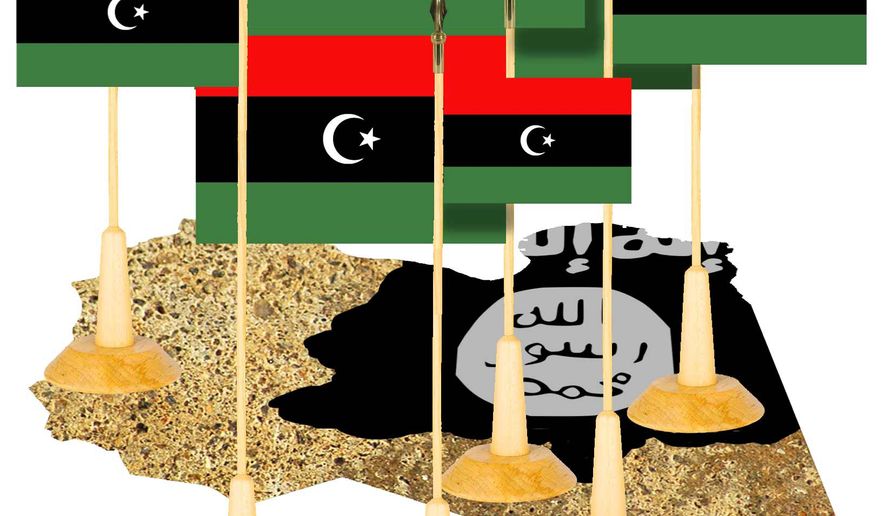(Republished from Washington Times)

The increasing influence of the Islamic State, or ISIS, in Libya testifies to the fact that organized terrorism feeds on political instability and confusion. Libya has suffered continuous political chaos since the fall of Col. Moammar Gadhafi’s regime in 2011 and while not a failed state, it is on the verge of failure and incapable today of defeating ISIS.
Libya is ostensibly run by a Presidential Council, headed by Prime Minister Fayez Al-Sarraj, but hasn’t been able to control nongovernmental militias and rogue military commanders like Gen. Khalifa Haftar, who have exploited the country’s chaos to gain political and financial power. Until that happens, the unity and stability so essential to eradicating ISIS will be difficult if not impossible to achieve.
Efforts to centralize political governance since Gadhafi’s fall have been hampered by the competing interests of those who actually benefit from the chaos. It’s gotten to the point where rather than work with the legitimate internationally recognized government in Tripoli, warring factions have continued to work with the now-dissolved competing “government” in Tobruk.
Gen. Haftar commands forces that have been recognized as the “National Army” by this Tobruk-based faction. Apart from using this force to fight his political rivals, Gen. Haftar’s army provides the Tobruk breakaway government with teeth, in opposing Tripoli and the nation’s official military leadership.
Though projecting the facade of a national institution, Gen. Haftar’s army is currently little more than a glorified militia. During Libya’s immediate post-revolution days, the transitional government at the time wanted to rein in disparate militias by having them register under the Ministry of Defense. Gen. Haftar saw this invitation as an opportunity to legitimize his army and like many other militias, registered his force through the ministry, but cunningly named it the “National Army.”
This nominal facade, along with recognition by Tobruk, has led some in the international community to accord Gen. Haftar’s forces more recognition than other militias and, with it, an air of legitimacy. In reality, neither Gen. Haftar nor his rivals control a force that represents a united army of Libya. In their struggle for supremacy, they have acted as enablers for ISIS while each uses the threat they have allowed to fester as an excuse to continue their essentially local turf wars.
Numerous eyewitnesses confirm the extent of Libya’s increasingly disastrous security situation. For example, the Carnegie Endowment’s Frederic Wehrey, who spent weeks on the ground in Libya, noted in recent testimony before a Senate committee that rival factions see each other as a much greater threat than ISIS with the result that as they fight each other, ISIS flourishes.
This disarray stands in the way of the government’s ability to coordinate resistance to ISIS and make it hard for Western powers like the United States to help. The U.S. and her allies are reluctant to provide badly needed supplies when they can’t be sure who actually represents the country. A U.N.-backed unity government was put together to counter this political chaos, but continues to face opposition from those who amassed significant power after Gadhafi’s fall. Even if a new government does galvanize enough popular support to consolidate itself into a central force, the challenge of forming a single national military that operates under one command structure remains incredibly daunting.
The process should start with all sides recognizing the legitimacy of Article VIII of the Libyan Political Agreement that produced Libya’s current government. This agreement confirms that the Libyan Army remains the nation’s official military, and that Libya’s new Presidential Council is its supreme commander. A consolidation of Libya’s disparate armed factions must take place before the West can help train fighters, provide aid, or support the country’s anti-ISIS ground forces. Gen. Haftar must step aside for the greater good of the country; political differences can be negotiated later, but Libya simply can’t afford to have self-serving military figures risk the country’s safety at a time of profound crisis.
There’s still time. ISIS has yet to successfully tap into the popular sense of frustration and discontent that’s prevalent throughout the country. Libyahasn’t yet become an effective base for ISIS to sustain itself. The country’s remote south and difficult terrain has presented serious challenges to the terrorist group, which is beginning to find Libya’s environment increasingly inhospitable, so any bleak assessment of the Islamic State’s presence shouldn’t lead to hasty, heavy-handed interventions by the U.S. or its allies. Libya still has multiple actors that are capable of and willing to fight against if the West can help them come together to fight and defeat ISIS.
• Esam Omeish is a Libyan-American physician living in Washington, D.C., former president of the Libyan Emergency Task Force, and former chief of general surgery at Inova Alexandria Hospital.


